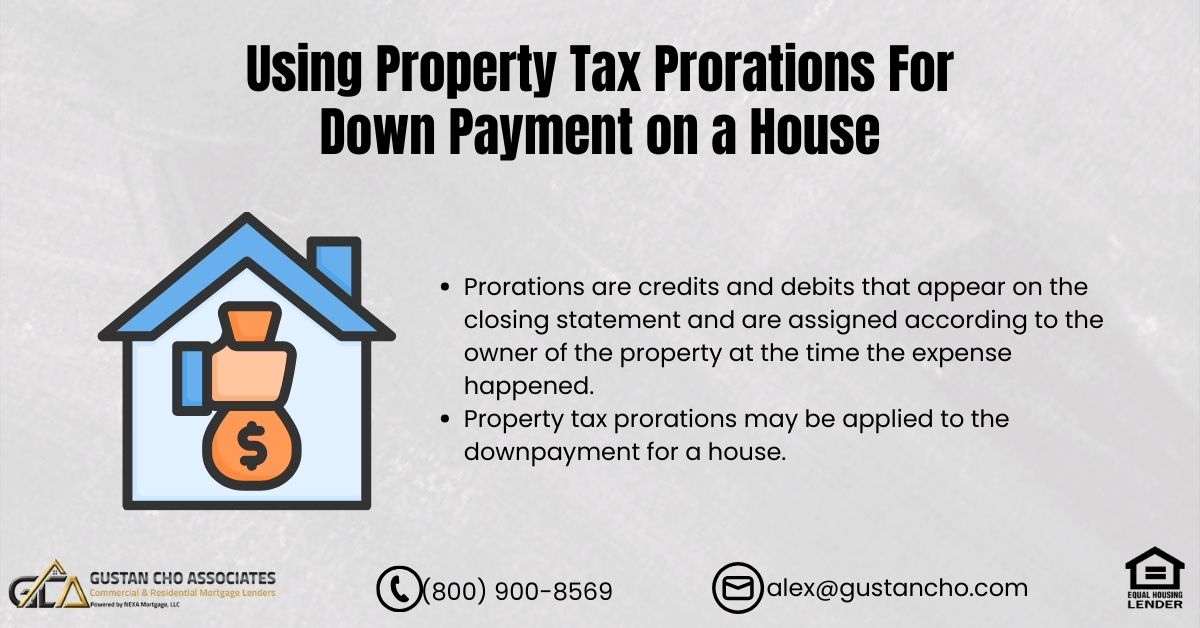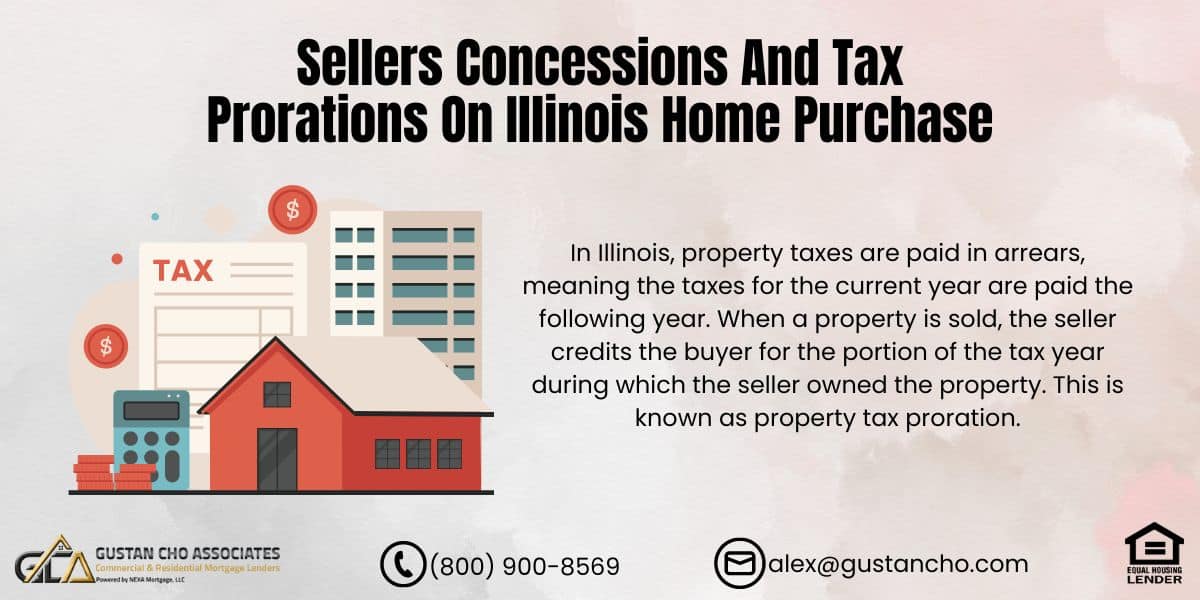-
Alabama tax proration
Posted by Rhonda on June 28, 2024 at 5:20 pmCan the seller tax proration that is credited to buyer at close. Will that be allowed to count towards the 3.50 % down payment. I know it is allowed, but can it be used to show that is where the part of remaining proceeds will be coming from?
Rhonda replied 11 months, 2 weeks ago 4 Members · 5 Replies -
5 Replies
-
Concerning the sale of properties, tax proration refers to the division of property taxes between a buyer and seller based on the portion of a year each party possesses it. This guarantees that everyone pays equal amounts in terms of annual property rates. A minimum down payment for an FHA loan is 3.5% of the purchase price. The buyer must have this amount from their own funds or eligible sources such as gifts from relatives or grants given by down payment assistance programs.
Credits for Tax Proration:
Definition: Frequently at closing, sellers give buyers credits equal to what they owe in taxes up till the day when title transfers; usually applied against closings costs.
Down Payment Use: Ordinarily one cannot use credit received through prorating taxes towards satisfying requirement for down payment on an FHA loan because according to this type federal mortgage program all monies used as down payments should come directly out someone’s pocketbook – not even allowed if its borrowed cash. Tax credits are seen as concessions made by sellers who may apply them towards covering part or whole amounts due at closing.
Illustration about How Taxes Can Be Prorated:
Assume that there is a house with an annual tax bill totaling four thousand dollars ($4,000) and suppose further that this home gets sold on June 30th which represents exactly half way through year; then what will happen is seller shall take care of paying property levies starting from January first until end June (that’s six months). In other words seller is liable for two thousand dollars ($2,000) worth of real estate charges which are credited back to buyer during final settlement transaction.
Model for Down Payment:
If cost were $200k minimum under FHA rules would be seven thousand ($7k); however person buying has got no choice but to get money themselves since these mortgages do not allow outside help except from approved sources e.g., family gift or grant program designed specifically assist those in need paying first homes.
Application of Tax Proration:
To clarify, the two thousand ($2k) received by buyer from seller should not be used towards meeting seven thousand dollars ($7k) required as downpayment. Instead, it can be employed against other closing costs that may be due at settlement such as appraisal fee etc.
HUD Guidelines: In accordance with Single Family Housing Policy Handbook (HUD Handbook 4000.1), no credits or concessions shall reduce minimum investment amount necessary for any given purchase transaction; however they can help defray costs related to closing like origination fees; title insurance premiums and other expenses allowed by law. Although this might lower cash outlays on buyers part when buying property through FHA financing still such monies cannot substitute what’s considered an acceptable down payment according their regulations which states three point five percent (3.5%) must come directly out one’s pocketbook without exception being made either way. Typically credit given over taxes prorated will cover some charges thus relieving purchaser financially but without affecting obligation make good on initial contribution as stated above.
-
your writing skills, are so amazing. As I know we will need to source where the 3.50% will come from on a 160,000 home. Down payment will be 5,600.00. As seller will be paying 6% buyers cost, trying to limit so much out of pocket. Or at least know best plan with easiest way. Already rents home has for 14 years, not getting into all that. My thinking be prepared for 3.50. Time it right, where no monthly rent needed. Use that and have no note due until following month.
Buyer will pay upfront for appraiser, show it came from borrowers checking account, own funds. Get reimbursed with seller concession, apply towards amount needed for close,.
Thank you! Here’s a plan for minimizing out-of-pocket expenses when purchasing a $160,000 home:
Down Payment and Closing Costs
-
Down Payment Calculation:
- Home Price: $160,000
- Down Payment (3.5%): $5,600
-
Seller Concessions:
- Seller pays 6% towards buyer’s closing costs, which is $9,600.
- This can cover many expenses like loan origination fees, title insurance, and other closing costs.
Structuring the Purchase
-
Sources for Down Payment:
- Personal savings.
- Gifts from family members.
- Down payment assistance programs (if eligible).
-
Timing the Purchase:
- Close at the end of the month to minimize initial interest payments.
- Avoiding rent for the last month can help save funds for the down payment.
-
No Payment Due Until the Following Month:
- Closing later in the month means your first mortgage payment won’t be due until after the next full month, allowing more time to save.
Additional Tips
- Pre-approval: Get pre-approved for your loan to understand exact requirements and limits.
- Budgeting: Ensure you have enough for the down payment plus a buffer for unexpected expenses.
- Communication: Work closely with your lender and real estate agent to optimize the deal structure.
By planning carefully and using seller concessions effectively, you can reduce your out-of-pocket expenses while securing your new home. If you have any questions or need further details, feel free to ask!
-
-
Depends on the wholesale mortgage lender. Regardless, you need to show the 3.5% down payment as verified funds. You cannot count the property tax proration as verified funds for the down payment. Wholesale lenders will allow not to bring the amount of the property tax proration to closing as long as you have the documented 3.5% down payment in your bank account. Here is an informative article on Gustan Cho Associates that will help you understand this better, Rhonda.
https://gustancho.com/property-tax-prorations/
gustancho.com
Using Property Tax Prorations For Down Payment on a House
Homebuyers can use property tax prorations by sellers for the down payment on a home purchase but still need to show they have the funds
-
Seller Concessions and Property Tax Prorations for Down Payment and Closing Costs
While purchasing a home, seller concessions and property tax prorations can reduce the buyer’s out-of-pocket expenses. There are rules about how they can be used though, especially for different types of loans such as FHA or conventional ones.
Seller Concessions
Definition: Seller concessions refer to contributions the seller agrees to make towards the buyer’s closing costs, which may involve loan origination fees, appraisal costs, title insurance, etc., among other closing expenses.
Loan Type Limits:
FHA Loans: Up to 6% of the purchase price can be allowed as seller concessions. These can cover closing costs but not be used for meeting minimum down payment requirement.
Conventional Loans: The limit varies with seller concession on these loans as follows:
For less than 10% down payment; usually up to 3% of purchase price is acceptable
10-25% down payment; usually up to 6% is acceptable
More than 25% down payment; sometimes limits go even higher such that sellers are allowed giving buyers up-to 9%.
Usage: Various closing costs can be covered by seller concessions including:
Loan origination fees
Appraisal costs
Title insurance
Property taxes
Homeowners Insurance
Prepaid interest
Important Note: Cash needed at closing may be reduced by seller concessions but cannot be used towards lender’s required minimum down payments.
Property Tax Prorations
Definition: Property tax proration means dividing property taxes between buyer and seller depending on who owns it during what portion of a year. Basically what happens here is that when you buy a house from someone else at any point in time before next tax period begins then some amount equaling proportionate share should have been paid by either party but instead all accumulated amounts are credited forward until due dates show up again after which current year’s estimated value becomes due upon new owner.
Usage:
It’s common practice to apply property tax prorations as a credit towards buyer’s closing costs. Like seller concessions, this helps reduce the amount of cash required from buyers when they close on their homes.
Combining Seller Concessions and Property Tax Prorations
FHA Loans:
Seller Concessions: Can be used for closing costs rather than for the down payment.
Property Tax Prorations also go towards closing costs; these credits reduce total cash needed at closing but do not count towards the down payment.
Conventional Loans:
Seller Concessions: Various closing costs can be covered by FHA loans within specified limits which are similar to those set forth under this type of loan program too so there isn’t really much difference between them other than some slight variations here or there depending on what might have been agreed upon during negotiations between buyer and seller at time of purchase agreement signing itself etcetera…
Property Tax Prorations – Helps Reduce Buyer’s Closing Expenses
Example Scenario
Home Purchase Price: $300,000
Down Payment Required: For FHA, 3.5% ($10,500); for conventional, varies (e.g., 5% would be $15,000).
Seller Concessions: Up to 6% for FHA ($18,000), depending on the loan type for conventional.
Property Tax Proration: Assume a $1,500 credit for prorated taxes.
FHA Loan Example:
Down Payment: $10,500 (must come from buyer’s funds or acceptable sources such as gifts).
Closing Costs: Suppose closing costs are $7,000.
Seller Concessions: Seller agrees to pay $6,000.
Property Tax Proration: $1,500 credited to buyer.
Net Closing Costs: $7,000 (closing costs) –$6,000 (seller concessions) –$1,500 (tax proration) = $500 (remaining closing costs to be paid by buyer).
Down Payment: Still, the whole $10,500 down payment needs to come from the buyer’s cash. One way for buyers to plan their finances better and lower closing costs is by comprehending seller concessions and property tax prorations. But they should account for minimum down payment requirements both out of pocket or other acceptable sources as well.
Here is another informative blog published on Gustan Cho Associates that you may find useful, Rhonda:
https://gustancho.com/sellers-concessions-and-tax-prorations/
gustancho.com
Sellers Concessions And Tax Prorations On Illinois Home Purchase
Sellers concessions and tax prorations can be major benefit for home buyers in Illinois. Tax prorations can be used to offset down payment and closing costs
-
Yes this is exactly what I need. This is wonderful information, just having a back up plan. As I prepare for 3.50% .
But our home insurance quotes have sky rocketed. This property has non homestead property taxes. So that makes monthly payment higher , first year. So I was looking for a plus in the event . Issue arises not that I expect.
Alabama is an arrear state also.


